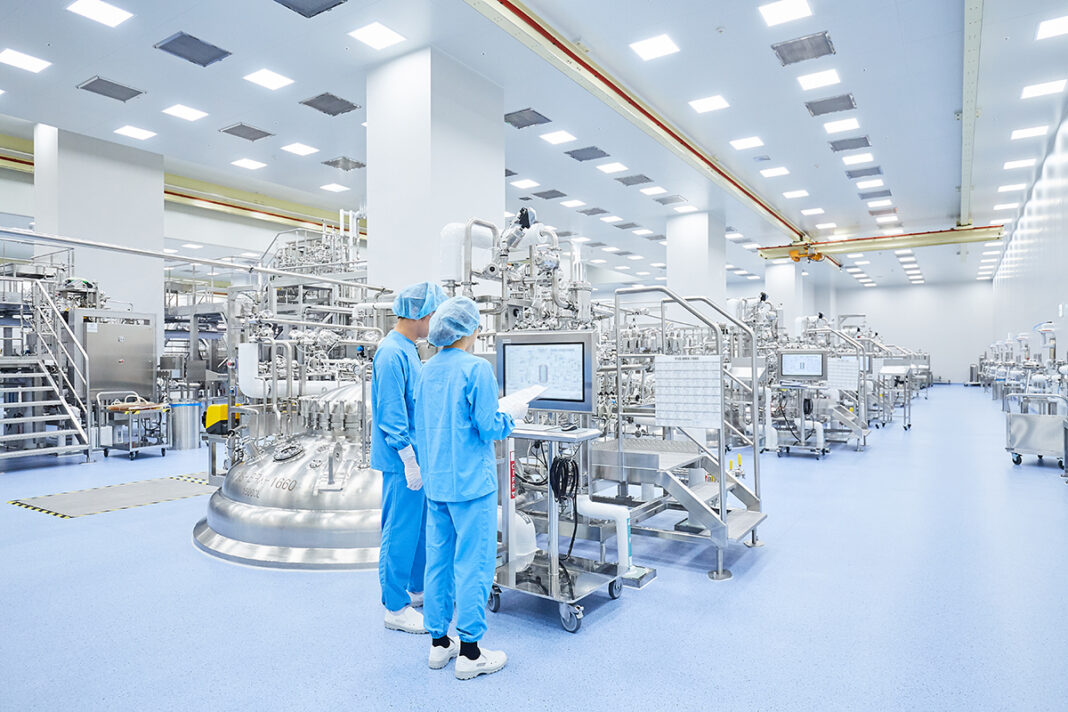Founded 12 years ago, CDMO Samsung Biologics initially began with six 5k-liter reactors. Driven by demand, they added ten 15K-liter reactors and then built a third plant with twelve more. Plant number four is two plants in one: six 10K-liter reactors for mid-scale production and twelve additional 15K-liter reactors for large scale.
“These 604,000 liters of capacity serve 13 of the top 20 major global pharmas along with many mid-size biotechs worldwide,” said James Choi, executive vice president, chief marketing officer and head of global public affairs at Samsung Biologics. “Anticipating further demand we broke ground on plant five in our second Bio Campus, which is 30% larger in terms of land mass compared to our current campus with enough square footage for four mega plants.”
Each mega plant is intended to contain twelve 15K-liter reactors. A planned open innovation center will support overall technology growth. When this expansion is complete over 1.3M liters of capacity will be available to meet specific client manufacturing needs from large-scale to mid-scale and even small-scale, down to a single-use bioreactor.
“First and foremost, clients need manufacturing capacity at the right scale at the specified schedule of their launch to meet demands. We ensure that the supply will be uninterrupted,” added Choi.
Samsung Biologics is not just about building plants at record speed, he continued, noting that the manufacturing facilities are operated under cGMP conditions and regularly pass inspections from a vast array of regulatory authorities to ensure adherence to specific market requirements. “We have over 230 successful regulatory approvals from all the major agencies, including the FDA, EMA, and other countries like Japan and Brazil.”
Although scale, capacity, and a proven track record of regulatory approvals and quality execution are required, sustainability is also emerging in importance.
Emerging Importance of Sustainability
More studies are demonstrating a direct linkage between climate change and global health. “Since they are responsible for global health, pharma companies are taking the lead and making commitments to climate change goals and analyzing the sources of their carbon emissions,” said Choi.
Emissions come from three areas. Scope 1 emissions are direct from sources owned or controlled by a company, Scope 2 emissions are indirect from purchased electricity, steam, heat, and cooling, while Scope 3 includes all other emissions associated with a company’s activities, especially its supply chain.
In most companies, Scope 3 usually accounts for the majority of emissions within their product lines. “As a service provider we are part of Scope 3,” explained Choi. “In order for the pharma industry to achieve their net zero targets, their suppliers, like CDMOs, must be just as committed to match or exceed these targets.”

“Samsung Biologics is privileged to participate in the Sustainable Markets Initiative (SMI), which was inaugurated by King Charles III. In this role we work with companies like AstraZeneca, GSK, Novo Nordisk, Sanofi, Roche, and Merck,” said Choi.
Launched at The World Economic Forum 2020 Annual Meeting in Davos and under the mandate of the Terra Carta, the SMI’s mission is to build a coordinated global effort to enable the private and public sectors to accelerate the transition to a sustainable future.
Each participant plays a part in SMI. Samsung Biologics is responsible for championing the Supply Chains Working Group, which aims to reduce the carbon footprint in supply chains, about 50% of all emissions in healthcare. The Supply Chains initiative is working to first set standards and metrics for achieving net zero and, secondly, to find green energy, power purchase agreements (PPA), especially in Asia.
“In Europe and the U.S., it is a fairly mature market in terms of PPA agreements,” clarified Choi. “But this is not the same for countries like China and India. We are focusing on accelerating the launch of PPAs in these geographical areas.”
Green logistics are also important. Since many items are shipped by sea freight, green transportation corridors are being looked at in addition to sustainable aviation fuel. Although this fuel is more expensive it reduces the carbon footprint significantly. “Over time if we work with other companies to drive demand, the cost will come down,” emphasized Choi.
The last piece is circularity, which is finding sustainable materials and packaging, pharmaceutical supplies, and “green heat.” A lot of heat is generated, especially in small molecule production, and potentially this heat could be collected and used for heating buildings or the production of hot water. “These are all areas across the entire manufacturing and logistics supply chain being evaluated with pharmas as well as the public sector such as UNICEF, WHO, and the U.K. NHS,” summarized Choi.
Samsung Biologics’ current main focus as a CDMO provider is on monoclonal antibodies. The company recently broke ground on an ADC conjugation facility for the next generation of these therapeutics. Manufacturing RNA-based vaccines and other mRNA-based drug substances are also parts of their expertise.
With an eye to the future, the CDMO also supports cell and gene therapy through the Samsung Life Science Fund, an investment fund created jointly with Samsung C&T, and has invested in Jaguar Gene Therapy, Senda Biosciences, and Araris Biotech AG.


